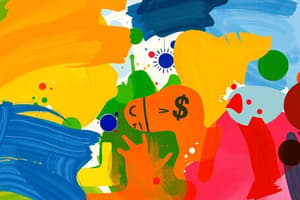Podcast
Questions and Answers
What is the primary focus of microeconomics?
What is the primary focus of microeconomics?
- Analysis of individual agents, such as consumers and firms (correct)
- Examination of government fiscal policies
- Study of aggregate economic indicators
- Investigation of global economic trends
Which of the following is NOT one of the fundamental economic questions?
Which of the following is NOT one of the fundamental economic questions?
- For whom to produce?
- How to produce?
- When to produce? (correct)
- What to produce?
What does GDP measure?
What does GDP measure?
- The consumer price index over a set period
- The overall employment rate in an economy
- The total number of unemployed individuals in a country
- The total value of all goods and services produced in a country (correct)
What is opportunity cost?
What is opportunity cost?
Which economic theory advocates for minimal government intervention?
Which economic theory advocates for minimal government intervention?
What typically characterizes a market economy?
What typically characterizes a market economy?
What is the Law of Demand?
What is the Law of Demand?
Which concept describes the ability of a country to produce a good at a lower opportunity cost than another?
Which concept describes the ability of a country to produce a good at a lower opportunity cost than another?
Flashcards are hidden until you start studying
Study Notes
Key Concepts in Economics
Definition
- Economics: The study of how societies allocate scarce resources to meet unlimited wants. It examines production, distribution, and consumption of goods and services.
Branches of Economics
- Microeconomics:
- Focuses on individual agents (consumers and firms).
- Studies supply and demand, price formation, and market structures.
- Macroeconomics:
- Studies economy-wide phenomena.
- Deals with aggregate indicators (GDP, unemployment, inflation).
- Analyzes fiscal and monetary policy.
Fundamental Economic Questions
- What to produce?
- How to produce?
- For whom to produce?
Economic Systems
- Market Economy: Decisions based on supply and demand; minimal government intervention.
- Planned Economy: Government makes all economic decisions (e.g., socialism).
- Mixed Economy: Combination of market and planned economies.
Key Economic Indicators
- Gross Domestic Product (GDP): Measures the total value of all goods and services produced in a country.
- Inflation Rate: The percentage increase in the price level of goods and services over time.
- Unemployment Rate: The percentage of the labor force that is unemployed and actively seeking employment.
Supply and Demand
- Law of Demand: As the price of a good decreases, the quantity demanded increases, and vice versa.
- Law of Supply: As the price of a good increases, the quantity supplied increases, and vice versa.
- Market Equilibrium: Occurs where the quantity supplied equals the quantity demanded.
Costs and Benefits
- Opportunity Cost: The value of the next best alternative forgone when making a decision.
- Marginal Analysis: Evaluating the benefits and costs of one additional unit of production or consumption.
Economic Theories
- Classical Economics: Emphasizes free markets, competition, and the self-regulating nature of the economy.
- Keynesian Economics: Advocates for government intervention to manage economic fluctuations and stimulate demand.
- Supply-Side Economics: Focuses on boosting economic growth by reducing taxes and decreasing regulation.
Trade and Globalization
- Comparative Advantage: The ability of a country to produce a good at a lower opportunity cost than another country.
- Trade Barriers: Tariffs, quotas, and regulations that restrict international trade.
Development Economics
- Examines economic development in low-income countries.
- Focuses on poverty reduction, sustainable growth, and human capital development.
Behavioral Economics
- Studies how psychological factors affect economic decision-making.
- Challenges the assumption of rationality in traditional economic models.
These notes provide a concise overview of key economic concepts, theories, and indicators, covering fundamental principles essential for understanding economics.
Economics Definition
- Economics studies how societies allocate scarce resources to satisfy unlimited wants.
- It analyzes the production, distribution, and consumption of goods and services.
Branches of Economics
- Microeconomics focuses on individual economic agents like consumers and firms.
- Studies supply and demand, price formation, and market structures.
- Macroeconomics analyzes economy-wide phenomena.
- Deals with aggregate indicators like GDP, unemployment, and inflation.
- Analyzes fiscal and monetary policy.
Fundamental Economic Questions
- What to produce? Societies must decide which goods and services to prioritize.
- How to produce? This considers the production methods and technologies used.
- For whom to produce? This addresses the distribution of goods and services among different groups.
Economic Systems
- Market Economy: Resource allocation is driven by supply and demand with minimal government intervention.
- Planned Economy: The government controls all economic decisions, often associated with socialism.
- Mixed Economy: Combines elements of both market and planned economies.
Key Economic Indicators
- Gross Domestic Product (GDP): Measures the total value of goods and services produced within a country's borders during a specific period.
- Inflation Rate: Measures the percentage increase in the price level of goods and services over time, indicating the rate of general price increases.
- Unemployment Rate: Measures the percentage of the labor force actively seeking employment but unable to find work.
Supply and Demand
- Law of Demand: As the price of a good decreases, the quantity demanded increases, and vice versa.
- Law of Supply: As the price of a good increases, the quantity supplied increases, and vice versa.
- Market Equilibrium: Occurs when the quantity supplied equals the quantity demanded, indicating a stable market price.
Costs and Benefits
- Opportunity Cost: Represents the value of the best alternative forgone when making a choice.
- Marginal Analysis: Involves evaluating the benefits and costs of producing or consuming one additional unit.
Economic Theories
- Classical Economics: Emphasizes free markets, competition, and the self-regulating nature of the economy.
- Keynesian Economics: Advocates for government intervention to manage economic fluctuations and stimulate demand during economic downturns.
- Supply-Side Economics: Focuses on promoting economic growth by reducing taxes and regulations.
Trade and Globalization
- Comparative Advantage: Occurs when a country can produce a good or service at a lower opportunity cost than another country.
- Trade Barriers: Impose restrictions on international trade. Examples include tariffs, quotas, and regulations.
Development Economics
- Focuses on economic growth and development in low-income countries.
- Prioritizes poverty reduction, sustainable growth, and human capital development.
Behavioral Economics
- Studies the impact of psychological factors on economic decision-making.
- Challenges the assumption of rationality prevalent in traditional economic models.
Studying That Suits You
Use AI to generate personalized quizzes and flashcards to suit your learning preferences.




